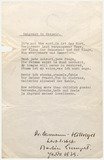Martin Gumpert
In allen Äußerungen dieses Arztes, Dichters und Historikers gibt es Töne und Akzente, deren menschlicher Ernst und unbedingte Echtheit ans Herz gehen.
[In every expression of this doctor, poet and historian are tones and accents whose human seriousness and unconditional authenticity go straight to the heart. (ed. trans.)]
Erika and Klaus Mann, Escape to Life, 1939
| Born | on 13 November 1897 in Berlin, Germany |
|---|---|
| Died | on 18 April 1958 in New York, United States of America |
| Exile | United States of America |
| Profession | Publicist, Writer |
In his autobiography Hölle im Paradies (Hell in Paradise), Martin Gumpert describes a walk through the suburb of Wedding in his hometown of Berlin. He had moved into a guesthouse and behaved as if he were a foreigner. Shortly afterwards, this became a reality: in 1936 the Jewish doctor and writer emigrated to America, moved into the Hotel Bedford and opened a surgery in New York. Originally a dermatologist, he became one of the first specialists in geriatrics there.
As a writer, Gumpert was influenced by the youth movement. His first collection of poems, Verkettung (Concatenation) appeared in 1917 in the expressionistic series Der jüngste Tag (The Youngest Day). After his studies he published primarily medical essays. In 1933, dismissed from his post as head doctor at Moabit Hospital, he began to write again, until the ban on his publication in 1936. He understood it as a form of resistance to write biographies of famous doctors who had dedicated their lives to humane ideas, such as Samuel Hahnemann.
In New York he was fully on his own and had to learn English. He wrote in succession his poetic cycle Berichte aus der Fremde (Reports from Abroad), the essay chronicle First Papers and the novel Der Geburtstag (The Birthday), works that dealt with the experiences of emigration, and his life as a German emigrant and naturalised American. In summer 1939 the writer was given a scholarship from the artists’ colony Yaddo. Gumpert was a close confidant of Erika Mann and a friend of Thomas Mann and Klaus Mann, who based figures in their novels upon him: the wise Mai-Sachme in Joseph und seine Brüder (Joseph and his Brothers) and Benjamin Abel in Der Vulkan (The Volcano). In 1949 Martin Gumpert accompanied Thomas Mann on his first trip to Germany.
Selected works:
Verkettung (1917)
Hahnemann (1934)
Dunant – Der Roman des Roten Kreuzes (1938)
Berichte aus der Fremde (1948)
Hölle im Paradies (1939)
First Papers (1941)
Der Geburtstag (1948)
Further reading:
Ittner, Jutta: Augenzeuge im Dienst der Wahrheit. Leben und literarisches Werk Martin Gumperts. Bielefeld: Aisthesis Verlag 1998




